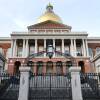Even before the Republican National Convention began, government ethics experts warned that hosting campaign events from the White House South Lawn and the Rose Garden could violate federal ethics law.
But just in the convention's first two days, Trump has gone even further — wielding the powers of his office and the federal government to promote his reelection campaign.
As part of last night's prime-time convention programming, Trump granted a presidential pardon from the White House. Secretary of State Mike Pompeo appeared from Jerusalem, where he was on official state business, to make a campaign speech with the Old City as backdrop. And acting Homeland Security Secretary Chad Wolf performed a naturalization ceremony on television as Trump looked on.
The Hatch Act prohibits federal employees from engaging in most political activity inside federal buildings or while on duty. Though the president and vice president are exempt from the civil provisions of the Hatch Act, federal employees like Pompeo, Wolf and any executive branch employees who helped stage the events, are not.
Ethics watchdogs harshly criticized Trump's merging of official and campaign acts during the Tuesday night telecast.
"The Hatch Act was the wall standing between the government's might and candidates. Tonight a candidate tore down that wall and wielded power for his own campaign," tweeted Walter Shaub, the former head of the U.S. Office of Special Counsel (no relation to former special counsel Robert Mueller's probe) that oversees high-level ethics issues inside the executive branch. Shaub left the office in 2017 after clashing with the Trump administration over the president's failure to divest from his businesses.
This summer, Pompeo and top State Department officials sent memos to employees reminding them they must be careful to adhere to the Hatch Act. Another memo said "Senate-confirmed Presidential appointees may not even attend a political party convention or convention-related event." That description also applies to Pompeo.
Richard Haass, the longtime president of the Council on Foreign Relations who has served in several Republican administrations, said it's inappropriate for a secretary of state to appear at a political convention while serving as the nation's top diplomat.
"A presumption of continuity in US foreign policy is essential if allies are to trust us & adversaries respect us," he wrote on Twitter. "Politicizing foreign policy increases the chance of wild swings & undermining bipartisan support. @SecPompeo decision to speak at #RNC2020 ill-advised and then some."
On Tuesday, House Democrats opened an investigation into Pompeo's speech, but it's unlikely that any Trump administration officials will face reprimand for using their office to promote the president's reelection.
The Office of Special Counsel can investigate allegations of Hatch Act violations and weigh in on them, but it's up to the employer to enforce the law. Based on past examples, it's unlikely the Trump administration would do so.
Last year, White House special adviser Kellyanne Conway was cited by the special counsel for Hatch Act violations and recommended she be fired, but remained in the job.
"Blah, blah, blah," she told reporters. "If you're trying to silence me through the Hatch Act, it's not going to work. Let me know when the jail sentence starts."
Cabinet members have spoken at conventions before. Several Obama administration officials addressed the Democratic National Convention in 2012, for example. But that convention was held in a sports arena, not in the White House, and did not feature Cabinet members conducting official business for the cameras.
Copyright 2020 NPR. To see more, visit https://www.npr.org.




